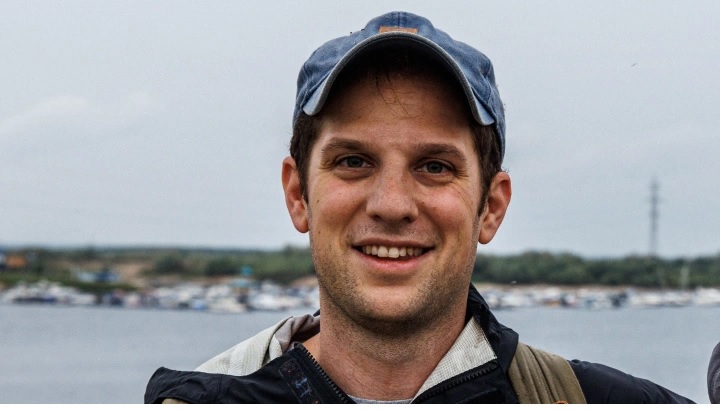Russia’s security service arrested an American reporter for The Wall Street Journal on espionage charges, the first time a U.S. correspondent has been detained on spying accusations since the Cold War. The newspaper denied the allegations.
Evan Gershkovich was detained in the Ural Mountains city of Yekaterinburg while allegedly trying to obtain classified information, the Federal Security Service, known by the acronym FSB, said Thursday.
The service, which is the top domestic security agency and main successor to the Soviet-era KGB, alleged that Gershkovich “was acting on the U.S. orders to collect information about the activities of one of the enterprises of the Russian military-industrial complex that constitutes a state secret.”
Kremlin spokesman Dmitry Peskov told reporters Wednesday: “It is not about a suspicion, is it about the fact that he was caught red-handed.”
“The Wall Street Journal vehemently denies the allegations from the FSB and seeks the immediate release of our trusted and dedicated reporter, Evan Gershkovich,” the newspaper said. “We stand in solidarity with Evan and his family.”
The arrest comes at a moment of bitter tensions between the West and Moscow over its war in Ukraine and as the Kremlin intensifies a crackdown on opposition activists, independent journalists and civil society groups. The sweeping campaign of repression is unprecedented since the Soviet era.
Earlier this week, a Russian court convicted a father over social media posts critical of the war and sentenced him to two years in prison while his 13-year-old daughter was sent to an orphanage.
Gershkovich is the first American reporter to be arrested on espionage charges in Russia since September 1986, when Nicholas Daniloff, a Moscow correspondent for U.S. News and World Report, was arrested by the KGB. Daniloff was released without charge 20 days later in a swap for an employee of the Soviet Union’s United Nations mission who was arrested by the FBI, also on spying charges.
At a hearing Thursday, a Moscow court quickly ruled to keep Gershkovich behind bars pending the investigation, according to the official Telegram channel of the capital’s courts.
While previous American detainees have been freed in prisoner swaps, a top Russian official said it was way too early to talk about any such deal.
There was no immediate public comment from Washington, although a U.S. official indicated the U.S. government was aware of the situation and awaiting more information from Russia.
Gershkovich, who covers Russia, Ukraine and other ex-Soviet nations as a correspondent in The Wall Street Journal’s Moscow bureau, could face up to 20 years in prison if convicted of espionage. Prominent lawyers noted that past investigations into espionage cases in the past took a year to 18 months during which time he may be held with little contact with the outside world.
The FSB noted that Gershkovich had accreditation from the Russian Foreign Ministry to work as a journalist, but ministry spokeswoman Maria Zakharova said Gershkovich was using his journalistic credentials as a cover for “activities that have nothing to do with journalism.”
Gershkovich speaks fluent Russian and had previously worked for the French agency Agence France-Presse and The New York Times. His last report from Moscow, published earlier this week, focused on the Russian economy’s slowdown amid Western sanctions imposed when Russian troops invaded Ukraine last year.
Ivan Pavlov, a prominent Russian defense attorney who has worked on many espionage and treason cases, said Gershkovich is the first criminal case on espionage charges against a foreign journalist in post-Soviet Russia.
“That unwritten rule not to touch accredited foreign journalists, has stopped working,” said Pavlov, a member of the First Department legal aid group.
Pavlov said the case against Gershkovich was built in order for Russia to have “trump cards” for a future prisoner exchange and will likely be resolved “not by the means of the law, but by political, diplomatic means.”
Russian Deputy Foreign Minister Sergei Ryabkov ruled out any quick swap.
“I wouldn’t even consider this issue now because people who were previously swapped had already served their sentences,” Ryabkov said, according to Russian news agencies.
TYT Newsroom


